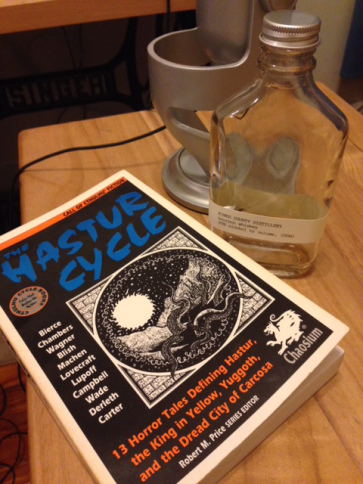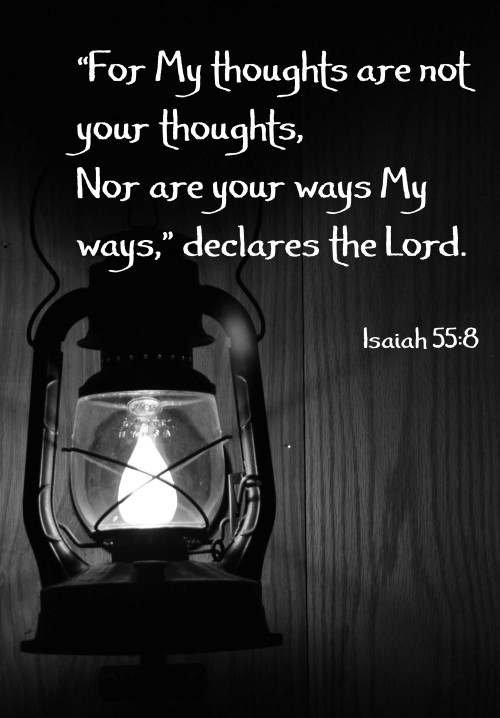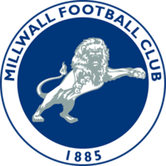

Result: Millwall 4-1 Barnsley (FA Cup 3rd Round)
Venue: The Den (Saturday 6th January 2018, 3pm)
Att: 5,319
The first weekend of the year arrived and, as is the norm, it featured the return of the FA Cup and the turn of the big boys to enter. The Prem sides bring with them the supposed “glamour” ties for those lower in the pyramid of course, but then there are the few Championship sides who also rock up as part of the late intake of the 2017-’18 year. It was to be one of the latter set of clubs that I would be visiting for Third Round day but I did have one issue come the previous evening before I travelled down to the capital. I had made no definitive decision on where I was actually about to end up. That was soon put to bed though…
My interests are usually peaked by those grounds that are under threat for one reason or another (having visited Brentford’s Griffin Park for last year’s Third Round & the Boleyn the season before that) and so I’ve had QPR’s Loftus Road on my list for some time now, though this doesn’t seem to be in any imminent danger of leaving us as it stands. One that does seem in some strife, sadly, is the (New) Den – home of the infamous “Lions” of Millwall. What with this and always having been interested in the stories that surround the Den and what have you, I decided that said ground would be my host for the first Saturday of the year. So after setting off at just after eight in the morning, I was soon arriving into Manchester for the train down to the smoke.
A very trouble-free journey down resulted in an early arrival into Euston which made the connection onto the tube all the more simple, although, having found the right line, I did contrive to almost board the train heading in the opposite direction. No eventual worries, though, and I was soon heading across the city and over into the shadow of the Shard where I’d catch the train for the short hop over to South Bermondsey station. Upon arriving here, I reckoned I’d be best served sorting my ticket early and so I made haste for the Den and was soon handing over my £15 which would allow me entry in a few hours time.

Arriving at Bermondsey
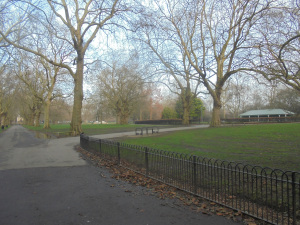
Southwark Park
From there I was headed back towards the river, around a 25 minute walk away, though I did try and get an answer on whether I could use my travelcard on the bus which runs just past the ground. Having been told something resembling a “yes” and a probable “no” from the staff and stewards I came across, I reckoned I’d be best served playing it safe and set off on foot. As I continued onwards towards the Thames, I bypassed a few decent looking pubs en route and kept one back, the Ancient Forester’s, for after the game. I wouldn’t end up there though.
Cutting through Southwark Park and the King’s Stairs Gardens, I was soon in Rotherhithe and, more specifically, the (dated 1620~) Mayflower which claims to be the place from which the ship of the same name began its journey over to the “New World” with the Pilgrim Fathers on board. Indeed, the mooring outside is apparently the very place, though I didn’t see it myself today. Instead I set up shop inside the packed bar with a pint of Blue Moon. This did set me back the eye-watering £5.80, but considering how brilliant this oak-beamed place is, it was worth the little extra. It is also, apparently, the oldest pub on the banks of the Thames, so is well worth a visit…for cultural reasons, of course!
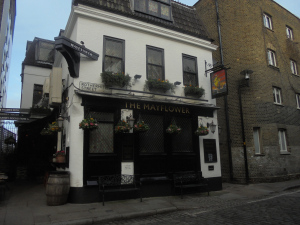
The Mayflower

The Ship
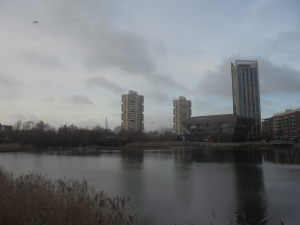
Canada Water
With the pub continuing to get busier – to the point it was getting pretty cramped for room – I decided it was high time to head slightly back on myself and to another pub just round the corner I’d passed on my way to the Mayflower. Passing the church and along the old workshop-lined cobbled street, I arrived at the Ship Inn. The Ship was a far, far quieter affair with only myself and other chap within and it was fairly cheap (in comparison anyway), with a pint of Amstel coming in at around £4.50. It was in here that I also decided I’d get a bit lazy and, instead of walking the short distance towards the town centre, I’d jump on the train at Rotherhithe and undertake the, what I thought, was a one-stop journey. It was two, but this did allow a circumnavigation of the Canada Water. I’d clearly been inspired by these Ship-related pubs….
Eventually I arrived at the town’s own Wetherspoon’s, which was a pretty uninteresting affair. A refreshing Hooch (£2.20) later and it was time to continue on just down the road to my final pre-match stop, the Farriers Arms. This was another decent little old-school boozer and was nice enough to spend twenty minutes in whilst watching the second half of the Fleetwood-Leicester early kick-off. This wasn’t too inspiring and I hoped my game held better as I began the short walk over to the Den.
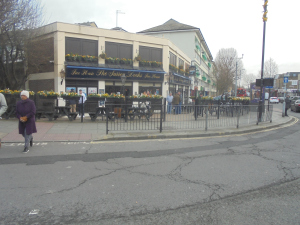
‘Spoons

The Farriers
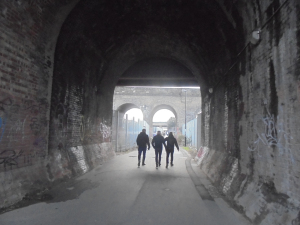
En route to the Den
Passing by a factory and under railway arches, the ground soon reappeared in front of me. With the area around the ground still seeming fairly quiet, I bought a programme (£2) and headed around to the front of the Main Stand for a quick picture prior to returning around to the Dockers Stand where I’d be watching today’s game from in the upper tier. Upon entering, I made sure of grabbing a pie for around £3.50 before heading out into the stand where, upon trying to locate somewhere close to where my seat is, a guy told me to “just sit anywhere”. I took his advice, though decided to stay in the same area I’d been given. This proved to be an interesting decision, as I soon seemed to be within some of the more vocal home support. This could be fun!
The New Den is a really nice ground in my opinion and sprung to my attention during Millwall’s play-off run the previous year. Despite being fairly new compared to some other grounds around, it still looks more traditional, having escaped the now usual bowl-like build seen all over the country. It hosts four separate stands, albeit fairly similar, with the Main Stand opposite us housing the tunnel, dugouts and hospitality areas. The Dockers Stand is a similar construction, with both being two-tiered affairs with good views over the action on offer. The wonderfully named Cold Blow Lane end stands to the left with the away fans travelling from Barnsley today housed just to the right in the stand with no name, at least visibly anyway! Both are also two-tiered, with the band of Tykes faithful given a section of the upper tier. So with all that out of the way, but before we get into the game, here’s the story of the Lions….
History Lesson:
Millwall Football Club was founded in 1885 as Millwall Rovers by workers of a canning and preserve factory in Millwall on the Isle of Dogs. Their first venue was on waste ground on Glengall Road where they played for just one season before moving to the nearby Lord Nelson Ground. In 1886, the East End Football Association created an East London FA Cup, which Millwall shared with London Caledonians having drawn 2-2 in the inaugural final. They then went on to win three straight East London Senior Cup titles between 1887 & 1889 which ended with Millwall being allowed to keep possession of the trophy having won it on each occasion they entered.
1889 saw the Rovers suffix replaced with Athletic as Millwall moved to the Athletic Grounds (still on the Isle of Dogs) which was the club’s first purpose-built ground. They’d remain here for the next eleven years until the land was reclaimed by the Millwall Dock Company for a timber yard. Their stay here was a successful one though as the club became founder members of the Southern League in 1894 and went on to win the title in each of the first two seasons of the league’s existence. The club followed these triumphs by entering a second team into the new United League in 1907 (with their first side still competing in the Southern League) and winning that twice too, these coming in 1897 & 1899.
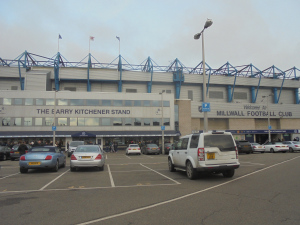
Millwall F.C.
The turn of the century saw a strong start as Millwall Athletic reached the FA Cup semi-finals in 1900 prior to their enforced move from the Athletic Grounds to North Greenwich. They became Millwall FC in 1903 and made a second FA Cup semi-final appearance that year. Following this, the club would switch from their second side from the United League to the Western League. Additionally, a third team was then added to the London League in 1902 too! 1903 saw the club drop its Western League side with their London League team winning the 1904 title prior to this team leaving to return to the Western League in 1905. The Western League outfit would win the Division 1 ‘B’ title in 1908 & 1909 prior with those being its last season before Millwall became a one senior side club through to the present day (bar 1946-’47 when they had a second side in the Southern League once more).
This all preceded the club’s move to the original Den in 1910 situated in the New Cross area of South London, a move away from their East London foundations. The first match here was against the reigning Southern League champions Brighton & HA, which Millwall won one-nil. They remained in the Southern League with little success through to the outbreak of WWI and had a sole season following the war (1919-’20) here too prior to joining the Football League at the end of that season, with the Southern League making up the majority of the league’s clubs making up the newly formed Third Division South. They won their first League match against Bristol Rovers 2-0 at the Den. They continued to become league challengers over the next few seasons before finally winning the Third Division South title in 1928 and being promoted to Division 2. They’d spend the following six seasons here before dropping back to the Third Division South in 1935 after finishing second bottom.
After again making the FA Cup semi-finals in 1937, the club would achieve a return to Division 2 in 1938, again as Third Division South champions. The outbreak of WWII made their return a short one though, with just a sole completed season played in prior to the abandonment of the Football League during hostilities, though they did appear in the Football League War Cup Final against Chelsea at Wembley in 1945 as the war entered its final throes. The Den had suffered heavy damage during the war (both through air raids and cigarettes burning down a stand) so the club were forced to play at Charlton, Palace and West Ham during the war-time competitions. Following the end of the war, Millwall returned to the league in 1946-’47 and continued on in Division 2, but lasted just that and a further season before being relegated again.
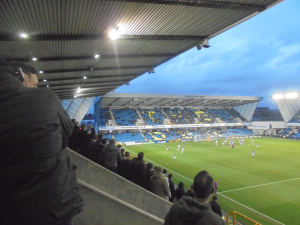
The Den
After successfully applying for re-election to the league in 1950 after finishing bottom of the league, the club finished as Division 3 South runners-up in 1953 but no promotion was forthcoming with only the champions going up. But a downturn in fortunes saw the club struggle towards the bottom of the table and end up being founder members of the new Division 4 in 1959. After winning the title in 1962, relegation soon followed two seasons later but only a sole season was encountered back in Division 4 as the club went up again, this time as runners-up. Better things were to follow immediately as the club went straight through Division 3, again going up as runners-up and found themselves in Division 2 for Season 1966-’67. This spell encompassed a 59 home game unbeaten record. The club would remain here through until 1975 (including hosting the first ever Sunday Football League game in 1974) when they were relegated back to Division 3, but once again only one season was taken before the club bounced back after taking the third promotion spot.
Relegation was again suffered in 1979, but this time it took six seasons for Millwall to escape the third tier, though they did win the Football League Group Cup in 1983 (the predecessor to the FL Trophy). Going up as runners-up in 1985, the Lions would spend three seasons in Division 2 before finally achieving promotion to the top-flight in 1988 as Division 2 champions under John Docherty. They competed up towards the top for a long while during their first season at the top level (with my all-time footballing hero Teddy Sheringham at the forefront) and even topped the league for a short time. They ended up 10th before again leading the table early on in the following season before horribly falling away and being relegated at the end of 1989-’90. After losing out in the 1991 Division 2 play-offs, the creation of the Premier League in 1992 saw Millwall now playing in the newly designated Division 1 where they remained through their move from their long-time home at the Den to their current New Den ground in 1993.
Finishing third at the end of their first season in the New Den, the club lost out in the play-offs before a drop in form saw relegation suffered in 1996, Millwall returning to Division 2. That season saw financial issues which resulted in a short-lived period in administration but things slowly recovered and the Lions reached the 1999 Football League Trophy final after a run which included a win on the (maligned or missed?) golden goal rule against Gillingham. They’d lose out to Wigan Athletic in the final, with the Latics again pouring misery on the club the following season by knocking Millwall out of the play-offs. However, this proved to matter little as Millwall won the title the next season and returned to Division 1, reaching the play-offs at the end of their first season back but losing out again in the semi-finals.
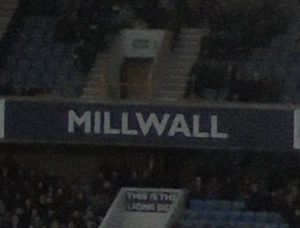
Millwall-This is the Lions’ Den
2003 saw the club reach the FA Cup Final at the Millennium Stadium under player-manager Dennis Wise and in Jeff Winter’s last game as a pro ref (his is a good book, I recommend it). This ended in a 3-0 loss to Manchester United, but did ensure the club were the first club from outside the top division to make the final since 1992. This meant a place in Europe for Millwall too, though a short-lived campaign was ended by Hungarian outfit Ferencváros. Division 1 was re-designated the Championship in 2004 and the club lasted a further two seasons when a large turnover of managers resulted in relegation in 2006. The club remained in League One through to 2010 when they reached the play-offs for the second successive season and beat Swindon Town to ensure a return to the second tier after four years.
Another FA Cup semi-final appearance followed in 2003 before Kenny Jackett left the club having become its fourth longest-serving manager. The sacking of his successor Steve Lomas in 2013 allowed Neil Harris his first taste of management (in a joint-caretaker role) prior to Iain Holloway being appointed soon after. His stay was short, leaving in 2015 with Harris returning as sole caretaker this time, though he couldn’t save the Lions from the drop. 2015-’16 saw better for Harris as he led Millwall to fourth place and the play-offs, but the club suffered defeat in the final to….Barnsley! Last season saw a successful one at the Den as the club knocked Premier League sides AFC Bournemouth, Watford and PL champions Leicester City on their way to the quarters. The end of the season saw Millwall make the play-offs again, after a sixth place finish, and this time they were successful, the Lions beating Scunthorpe in the semi-finals before defeating Bradford City in the final at Wembley.
After the strains of fine Millwall club anthem “Let ’em all come down to The Den” (which followed after each home goal too) had faded away, we got started with both sides staying fairly cagey but, as with all cup games, the tie was opened up on ten minutes as the visitors surged ahead. A cross in from the flank by Adam Hamill found its way to Brad Potts in the middle of the area and the Barnsley man had no trouble in sweeping the ball past home ‘keeper David Martin. One-nil to the Tykes and the home support went silent for a short while.
Millwall responded and a goalmouth scramble following a corner in the middle of the half almost saw them draw level before the Barnsley defence managed to scramble the danger away, before the Yorkshire side came close to doubling their advantage when striker Tom Bradshaw fashioned a chance for himself but saw his effort deflected out for a corner of which nothing came of. From there, though, Millwall began to find more of a foothold in the contest and they levelled with around ten minutes of the half remaining as Aiden O’ Brien got in to fire beyond Adam Davies.

Match Action
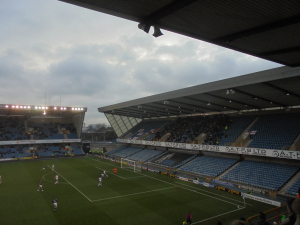
Match Action
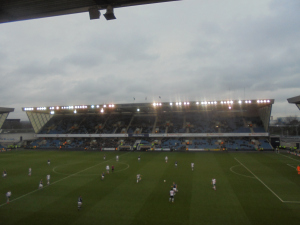
Match Action
Jed Wallace then went close to giving the hosts the lead late on in the half, but after just about beating Davies to the ball, his toe-poked effort went narrowly wide of the target and this ensured that both sides would head in at the break level-pegging, in what was a pretty fair reflection of the game so far. The half-time was pretty uneventful and so I’ll press straight on and get into the second half which was almost all one-way traffic.
About one minute after the whistle to begin the second half had blown, the Lions were in front. The Millwall dangerman of the day, O’Brien, added an assist to his earlier strike, providing a low cross for Ben Thompson to latch on to and fire past Davies for 2-1 which cued much celebration and hand-slapping within the group I was with in the home end, myself included. Anyway, this setback proved to be one that the visitors would never recover from and their cause was made all the more difficult when, just minutes after the hosts’ second strike, Joe Williams flew into a challenge on Wallace. The home players and fans alike weren’t too impressed with the challenge and the referee shared their view, giving Williams (one of three on the pitch) his marching orders, the Barnsley man giving the tunnel a boot on his way down it. Whether that was disappointment in the decision or himself, I don’t know. I wasn’t sure about generalisation of the “Dirty Northern Bastards” chant, though!
From there on it was all Millwall which, allied with some “interesting” chants being sent Barnsley’s way, I guess made for a fairly miserable experience for those who’d made the trip down. Five minutes or so after the red card had been unfurled, it was game over as Millwall’s third goal arrived. O’Brien was again at the fore of the attack, taking on Wallace’s wayward shot before coolly picking his spot and sliding past Davies from just outside the area. They quickly added a fourth on the hour when Fred Onyedinma was played in, found himself clear of the defence and finished clinically. The only question now was if Millwall would add more to their tally.
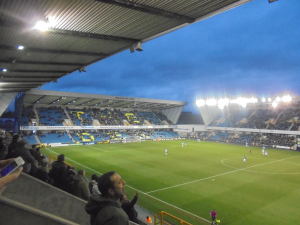
Match Action

Match Action
The answer to that was a pretty resounding “no” as the game pretty much petered out into nothingness and the final whistle arrived to signal Millwall’s passage into the Fourth Round and end what was, in the end, a one-sided game but one that was a decent watch too. A quick exit followed for me and, despite heading out the wrong way, I was soon back on the right track and heading back to the entrance to the station. However, my pub plan soon came into force when I saw the number of people stood on the raised platform and with more still heading up the ramp, I reckoned a post-match beer would be the best option. As I headed down the road back towards the Foresters I came across a sign which read “Eebria” and something about beer. The problem was this was pointing me through a shady railway arch and down a dark and seemingly lifeless back alley. Still, nothing ventured and all that so it was beer or something less than pleasurable. Luckily, it was the first! Two back-street pop-up craft beer bars within the arches came upon me and, after visiting the further one down for a can for the train home, I headed back to Eebria where I soon discovered there was only one drink left on. With a two-thirds pint costing £4.80, it wasn’t cheap, but it was certainly good!
They soon ran out of this beer too and this, from what I could gather, ended the bar’s trading for the night! One of the guy’s owning it was happily stating the loss of just one glass all night just when another was elbowed off one of the tables and ended in pieces on the floor. Smirking at his resulting bemoaning of the loss, he spotted me doing so and, laughing, said as much. I told him I knew the problem all too well, having dabbled in the line of work of late in my parents’ bar. After sharing some views on brewery’s etc. it was time for me to head over to the station for the first leg of my journey home. Soon back onto the tube (this time without any issues of wrong directions) I was quickly getting back into Euston whereupon I decided that I needed to use some facilities and oh, that’s right, the Doric Arch is right there isn’t it? What luck. A pint of the lovely Frontier (again not too cheap at just over £5) accompanied me through to the time to return to the station for the train back to Manchester. The trip back was made up of programme reading and drinking the fine canned beer which you can see below. Decent!
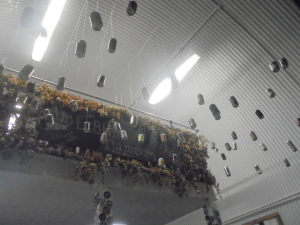
Eebria

Train accompaniments
So that ends my account of my trip to Millwall. It’s good to have ticked off one of those I’d always wanted to and especially so with the ground’s future being, sadly, in doubt. Hopefully it all works out preferably for the Lions. The day itself had been fairly costly, though I’d still saved, of course, on the ticket price. Pubs were decent, ground was good and the game was somewhere in between. All in all it had been a good one. Hopefully the Fourth Round sees some games fall favourably as I’m stuck in Walsall without a game….!
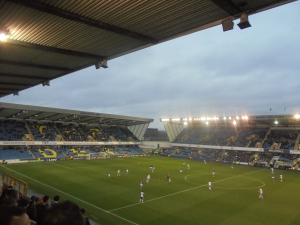
RATINGS:
Game: 6
Ground: 7
Food: 5
Programme: 5 (cut-back issue I think)
Value For Money: 7
Share this:

